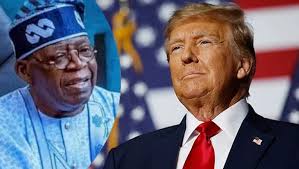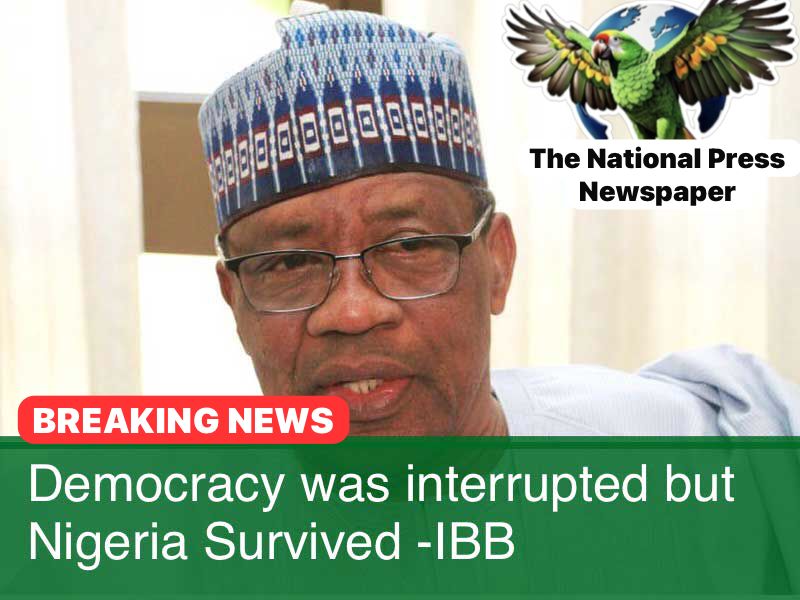With Donald Trump’s energy policy, FG’s N19.6trn revenue target under threat
Actuarial Practitioner has warned the Federal Government of Nigeria to be careful treading with Donald Trump’s, United State of America’s President economu policies as it will greatly affects year 2025 budget recently presented to the National Assembly.
Actuarial Science, a profession that predicted future economy using mathematics system, also predicted great budget deficit in financing year 2025 budget.
According to the professional body, Donald Trump’s economy policies will greatly affects Nigeria in the area of energy, Diaspora remittances, forex, oil and gas, others will be greatly affected.
AS Nigeria steps up efforts to implement its N54.9 trillion 2025 budget, experts have expressed fears that President Donald Trump’s energy policy, targeted at increasing oil output would impact the $75 per barrel target on which the budget is based, inflation and Diaspora remittances, among others.
With his ”Drill Baby Drill” energy policy, President Trump said America would invest in fossil energy resources, boost oil and gas output in order to meet its domestic needs, a development analysts said could lead to oversupply and low prices in the international market. Reacting, the director/CEO, Centre for the Promotion of Private Enterprise, CPPE, Dr. Muda Yusuf, said President Trump’s policy would hinder the realization of Nigeria’s $75 per barrel 2025 budget target, escalate high inflation, while stalling Diaspora remittances.
He said: “USA has been the largest oil producer globally for the past six years, noting that in 2023, it produced an average of 21.91 million barrels per day, which is about 22% of the global oil production. “The USA is positioned to influence global oil output and prices, especially the Trump administration has committed to increasing oil output to reduce energy prices in the USA and globally.
“The country also has the global diplomatic clout to influence the Organisation of Petroleum Exporting Countries, OPEC, oil output as President Trump has already signed an Executive Order creating a National Energy Dominance Council to drive the country’s energy dominance agenda. “The Trump administration is committed to moderating the current global geopolitical tension, especially the Russian-Ukraine war, and possibly the Israeli Hamas war. “If Trump succeeds in ending the war, especially the Russian- Ukraine war, the prospects for growth in global oil output would be considerably heightened as Russia supplies about 10 mbd of oil to the global oil market.”
Crude oil price benchmark of $75 per barrel under threat He said: “In light of these, the scenario of a weakening of crude oil prices in the near term is therefore very high. In this context, the crude oil price benchmark of $75 per barrel in the 2025 budget may not hold. This would impact the outlook for government revenue and foreign exchange earnings in 2025. “The decision of President Trump to opt out of the Climate change agreement [the Paris Accord] also has far reaching consequences for the global oil market.
This signals less commitment to climate change concerns and the acceleration of more investment in fossil fuels by the USA. Additionally, the sweeping imposition of trade tariffs on major US trading partners may weaken the global economic growth outlook, dampen global oil demand and depress oil prices. “However, the upside is that energy prices would drop globally – the price of diesel, PMS Jet fuel, gas etc. This would gladden the hearts of many economic players in the country. The transmission effect would be very fast because of the deregulated regime of the oil and gas sector.”
On implications, he said: “The Trump administration has demonstrated an unequivocal commitment to the ideology of economic nationalism, protectionism, deglobalization, unilateralism and reciprocity. and fragmentation of the global economy. This has unleashed a flurry of retaliatory trade policy actions from a number of countries across a wide range of product groups, even by the close allies of the United States. “Given the current trade policy disposition of the Trump Administration, AGOA faces the prospect of being terminated, although Nigeria has very little to show for the opportunities offered by the African Growth and Opportunity Act, AGOA.
“Meanwhile, the tariff war offers some opportunities for export and investment for Nigeria taking advantage of the gaps that the trade war may create in the countries involved, to the extent that Nigeria is not a victim of the tariff actions.”
High inflation, others coming
He said: “There is the prospect of high inflation in the USA as a result of the current tariff war. This thus creates a possibility of imported inflation from the USA for products imported from USA to Nigeria.
“The trade war may create export opportunities to the United States to fill supply gaps that the tariff war may create in the United States. Nigerian companies could position themselves to take advantage of these imminent supply gaps. New bilateral and multilateral trade alliances are likely to evolve due to the ongoing trade war.
“The trade war may trigger a disruption of global supply chains which may adversely affect the global economy, especially from a cost of supplies perspective for imported goods. “President Trump perceives members of BRICS and their allies as United States adversaries, seeking to reverse the dominance of the dollar in the global financial order. This perception could shape the disposition of the Trump administration towards these countries.”
Diaspora remittances, forex, budget, others to be impacted
He said: “Diaspora remittances may be affected by the current immigration policy of the Trump administration. The United States has a huge number of diaspora Nigerians, estimated at 500,000, many of which may be affected by the current immigration policy on documentation. “Heightened prospects of a drop in oil prices would negatively impact government revenue and foreign exchange earnings. This has implications for the outlook for revenue, fiscal deficit, government debt and exchange rate. The current budget benchmark of $75 per barrel may not stand in the circumstances.
are very high with the current Trump policies. There is an inverse relationship between the strength of the dollar and that of the other currencies. A stronger dollar will mean a weaker naira. This may result in higher import costs for domestic investors and invariably become inflationary.” Nigeria’s economy’ll face severe financial strain, revenue shortfalls – Egbomeade Similarly, Clifford Egbomeade, analyst and communications expert, said: “If President Trump succeeds in crashing global oil prices, Nigeria’s economy will face severe financial strain.
”Given that oil revenues account for the bulk of the country’s foreign exchange earnings and government funding, a price drop below the $75 per barrel benchmark would lead to significant revenue shortfalls. ”This would increase Nigeria’s budget deficit, forcing the government to borrow more, cut spending, or print money, all of which could further destabilize the economy. “A drop in oil prices would also weaken Nigeria’s foreign reserves, making it harder to defend the naira, leading to further currency depreciation and a rise in the cost of imported goods. In a country where inflation is already high, this could more economic hardship, worsening living conditions for millions.
“If Trump pushes for increased oil production and influences global supply, Nigeria’s economic projections for 2025 would become even more precarious.” A global surplus would drive oil prices downward, making it difficult for Nigeria to meet its budgetary obligations. Lower oil earnings would reduce the inflow of foreign exchange, putting additional pressure on the naira, which could lead to another round of depreciation beyond the already projected N1,400 per dollar exchange rate.
“A weaker naira would drive up inflation as the cost of imported goodsespecially food, fuel, and industrial materials-rises sharply. While lower oil prices might reduce the landing cost of petrol, the devaluation of the naira could offset these benefits, meaning Nigerians may not even feel the relief at the pump. The government’s ability to fund infrastructure, pay salaries, and service debt would also be constrained, potentially leading to further austerity measures”.
On way forward, Egbomeade, said: “The only sustainable path forward for Nigeria is to accelerate economic diversification and reduce dependence on crude oil. ”Increasing local production in agriculture, manufacturing, and services will provide alternative revenue sources and reduce reliance on volatile oil markets.”
USA oil impact over dramatised — NACCIMA
On his part, the President of the Nigerian Association of Chambers of Commerce, Industry, Mines, and Agriculture, NACCIMA, Dele Oye, said “this trump effect is being over-dramatised.” President Trump cannot increase oil production by rhetoric — Prof Wumi, analyst Similarly, a leading petroleum economist, Prof. Wumi Iledare, said Nigeria should not be bothered as USA has reached its peak production and needed a long time and investments to increase output. He said: “Crude oil price is not set by any institutions per se. The fundamentals of demand and supply determine the prices. In fact, it is in the interest of the USA not to experience crash in crude oil prices.
”The nation produces more crude oil at the moment than many oil producing countries. High oil prices drive that expansion.” Also reacting, David Adonri, analyst and Vice Executive Chairman at Highcap Securities Limited, said: “Crude oil is Nigeria’s main export earner although the sector contributes less than 20% to Gross Domestic Product, GDP. ”Fortunately, Donald Trump may not be able to crash the price of crude oil because the US has to export light crude to balance import of heavy crude which US refineries rely on. ”Crude oil producers in the US and OPEC will also not fold their arms and watch President Trump damage their business. However, the forecast is around $65/ barrel should the US over produce. “If there is excessive global supply of crude oil and price falls below FGN’s budget assumption, it will cause depreciation of the naira and fuel inflation but elimination of petroleum products import and liberation of the agricultural economy from the occupation of bandits and terrorists will make the impact on inflation less severe.” On the way forward for Nigeria, he said: “To insulate the Nigerian economy from external economic shocks, crude oil price should not be a yardstick for benchmarking the economy. Government should mobilize all the abundant domestic factors of production to create a self-reliant economy that will be influenced to a very limited extent by vagaries of the global supply chain”.





